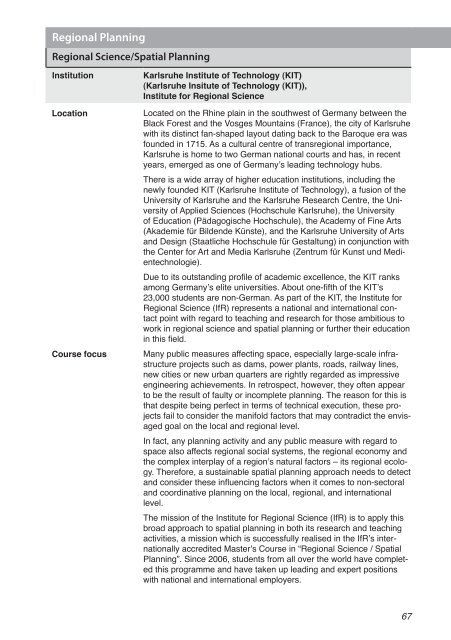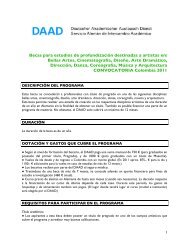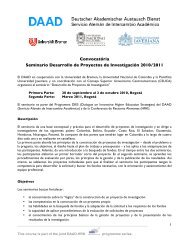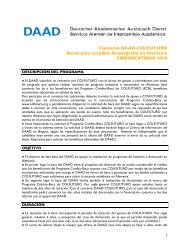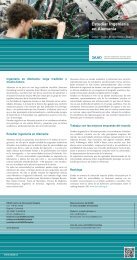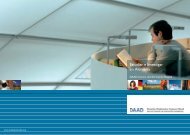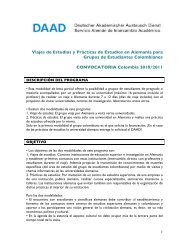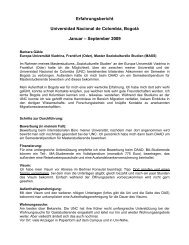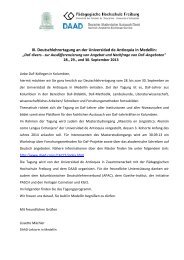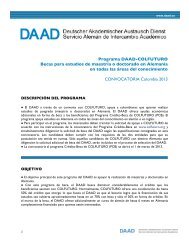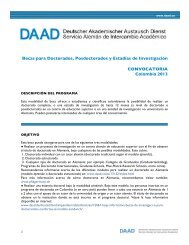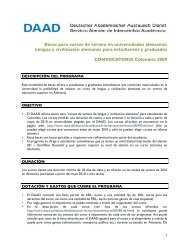Becas de Posgrado dirigidas a Profesionales de PaÃses en ... - Daad
Becas de Posgrado dirigidas a Profesionales de PaÃses en ... - Daad
Becas de Posgrado dirigidas a Profesionales de PaÃses en ... - Daad
You also want an ePaper? Increase the reach of your titles
YUMPU automatically turns print PDFs into web optimized ePapers that Google loves.
Regional PlanningRegional Sci<strong>en</strong>ce/Spatial PlanningInstitutionLocationCourse focusKarlsruhe Institute of Technology (KIT)(Karlsruhe Insitute of Technology (KIT)),Institute for Regional Sci<strong>en</strong>ceLocated on the Rhine plain in the southwest of Germany betwe<strong>en</strong> theBlack Forest and the Vosges Mountains (France), the city of Karlsruhewith its distinct fan-shaped layout dating back to the Baroque era wasfoun<strong>de</strong>d in 1715. As a cultural c<strong>en</strong>tre of transregional importance,Karlsruhe is home to two German national courts and has, in rec<strong>en</strong>tyears, emerged as one of Germany’s leading technology hubs.There is a wi<strong>de</strong> array of higher education institutions, including th<strong>en</strong>ewly foun<strong>de</strong>d KIT (Karlsruhe Institute of Technology), a fusion of theUniversity of Karlsruhe and the Karlsruhe Research C<strong>en</strong>tre, the Universityof Applied Sci<strong>en</strong>ces (Hochschule Karlsruhe), the Universityof Education (Pädagogische Hochschule), the Aca<strong>de</strong>my of Fine Arts(Aka<strong>de</strong>mie für Bil<strong>de</strong>n<strong>de</strong> Künste), and the Karlsruhe University of Artsand Design (Staatliche Hochschule für Gestaltung) in conjunction withthe C<strong>en</strong>ter for Art and Media Karlsruhe (Z<strong>en</strong>trum für Kunst und Medi<strong>en</strong>technologie).23,000 stu<strong>de</strong>nts are non-German. As part of the KIT, the Institute forRegional Sci<strong>en</strong>ce (IfR) repres<strong>en</strong>ts a national and international contactpoint with regard to teaching and research for those ambitious towork in regional sci<strong>en</strong>ce and spatial planning or further their educationMany public measures affecting space, especially large-scale infrastructureprojects such as dams, power plants, roads, railway lines,new cities or new urban quarters are rightly regar<strong>de</strong>d as impressive<strong>en</strong>gineering achievem<strong>en</strong>ts. In retrospect, however, they oft<strong>en</strong> appearto be the result of faulty or incomplete planning. The reason for this isthat <strong>de</strong>spite being perfect in terms of technical execution, these projectsfail to consi<strong>de</strong>r the manifold factors that may contradict the <strong>en</strong>visagedgoal on the local and regional level.In fact, any planning activity and any public measure with regard tospace also affects regional social systems, the regional economy andthe complex interplay of a region’s natural factors – its regional ecology.Therefore, a sustainable spatial planning approach needs to <strong>de</strong>tectand coordinative planning on the local, regional, and internationallevel.The mission of the Institute for Regional Sci<strong>en</strong>ce (IfR) is to apply thisbroad approach to spatial planning in both its research and teachingactivities, a mission which is successfully realised in the IfR’s internationallyaccredited Master’s Course in “Regional Sci<strong>en</strong>ce / SpatialPlanning”. Since 2006, stu<strong>de</strong>nts from all over the world have completedthis programme and have tak<strong>en</strong> up leading and expert positionswith national and international employers.67


